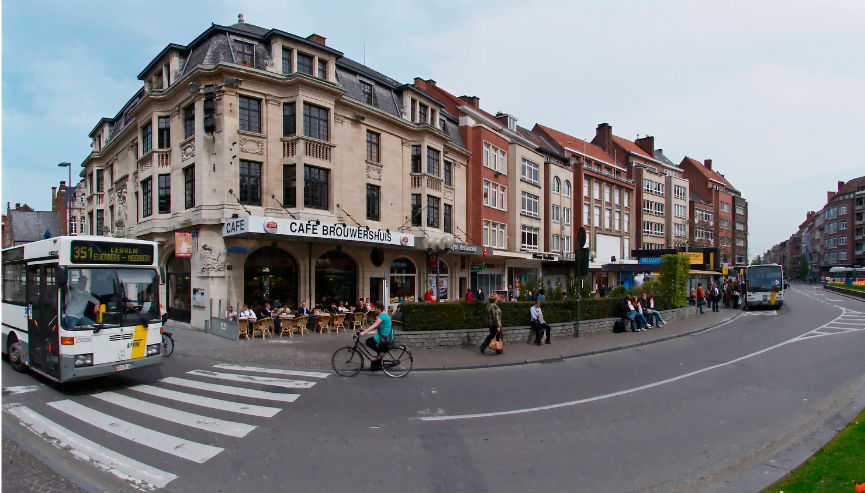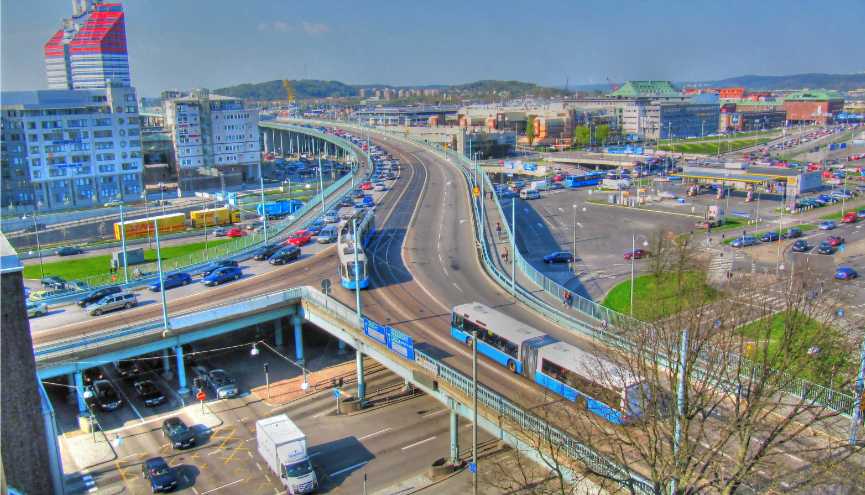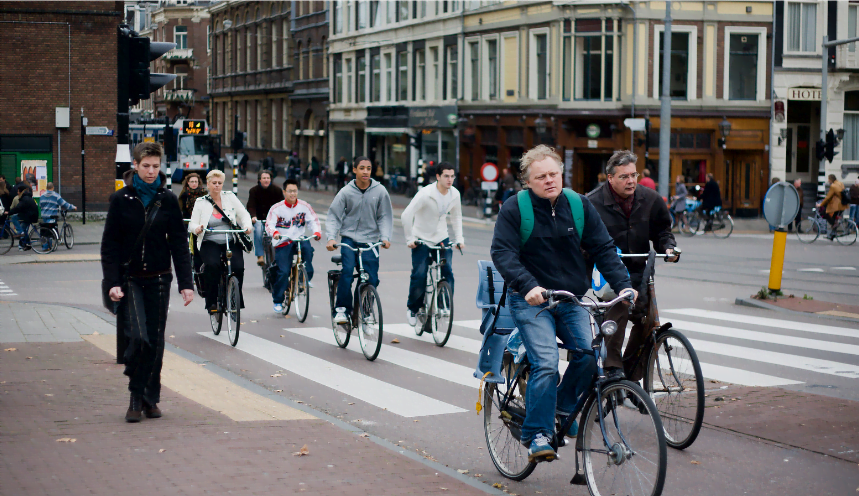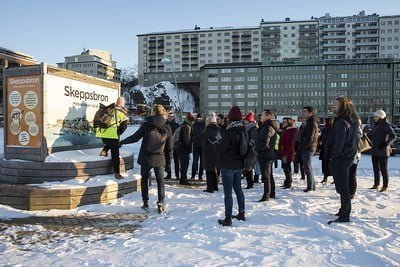Cities on a mission
The EU Climate Neutral and Smart Cities Mission cities have been announced, pledges have been made, and plans published. With 2030 just around the corner, the time for action is now! POLIS’ Climate Neutral and Smart Cities Mission Taskforce leader, Marko Stančec, spoke to four POLIS member Mission Cities about pursuing climate neutrality, the challenges ahead, and the solutions at hand.

Image of Leuven
While the Cities Mission requires a holistic and integrated approach to achieving climate neutrality, concrete results at the field level require a focused investment in specific components of urban life; mobility is, without a doubt, one of those crucial components.
In comes the Cities Mission taskforce. POLIS has launched a Climate-Neutral Cities Taskforce to support members in reaching transport decarbonisation targets. The goal? Not to duplicate tasks or resources planned by the Mission, but to address the gaps in a truly bottom-up approach. Achieving climate neutrality is a major – and daunting – undertaking, but by working together, we have a real chance of success.
What are our cities doing? So, what does the road to climate neutrality look like on the ground? To give you an honest answer, we spoke to several POLIS members who are part of the Mission about why they applied to the challenge, how they are working towards these goals…and what the future holds!
POLIS: Why did you apply for the Mission?

Image of Gothenburg
Tim (Asperges - Leuven): It was already Leuven's goal to become a Climate Neutral city by 2050. We were thrilled to hear about the Mission and knew from the get-go that we wanted to be part of this exciting opportunity to accelerate our transition to climate neutrality.
Karin (Bjerner - Gothenburg): It can indeed help Gothenburg to accelerate the transition to climate neutrality via the many opportunities it offers, such as access to tools, methods, and learning programs through the NetZeroCities platform to better structure the efforts, and cooperation and co-creation processes needed for boosting the pace of climate neutrality.
Vita (Kontić Bezjak - Ljubljana): In our case, we are committed to increasing the quality of life of our citizens, for which we have implemented over 2,400 measures and projects in line with our Ljubljana Vision 2025. However, times are rapidly changing, and ambitious goals must be set to achieve climate neutrality. Additional actions are therefore required and participating in the Mission can contribute to meeting those objectives.
Terry (Albronda - Groningen): Besides speeding up our ambition to reach climate neutrality in 2030 instead of 2035, Groningen seeks to disseminate its successes (but also failures!) to help other cities and their citizens achieve their climate goals more efficiently – we are not alone in this.
Tim Aspergers
Tim Asperges is Mobility Advisor at the City of Leuven. He has more than 20 years of expertise in urban mobility and was named 'Mobility Personality of the year' for Belgium in 2019. He has been working as expert advisor for the city of Leuven since 2014 and is currently president of the POLIS Network Management Committee.
Karin Bjerner
Karin Bjerner is Development Manager and Coordinator Climate Neutral Gothenburg at the City of Gothenburg. She has been working on sustainability topics as a project leader & coordinator for over 20 years. She currently works as Strategic Development Officer at the Environmental Administration, coordinating the EU mission on Climate Neutral & Smart Cities in Gothenburg.
Vita Kontić Bezjak
Vita Kontić Bezjak is Public Relations Advisor at the City of Ljubljana, where she began working in 2009. She currently focuses on promoting sustainable mobility and manages public relations, citizen engagement, promotion and other related duties.
Terry Albronda
Terry Albronda is Policy Advisor - Smart Mobility at the City of Groningen. He has over 25 years of experience in the mobility field, and has been working for the city of Groningen as policy developer for traffic management and smart mobility since 2011. He is highly committed to knowledge development and innovation and coordinates and focses on stimulating cooperation at different levels.
POLIS: How does sustainable mobility fit into your climate neutrality goals, and why is transport so important?

Image of Ljubljana
Vita (Ljubljana): Transport is the primary cause of urban air pollution. While we aim to become carbon-neutral by 2040, the Mission foresees more ambitious goals. Stricter sustainable mobility measures that would take us to the final destination by 2030 are thus necessary.
Karin (Gothenburg): Indeed, steps towards more sustainable mobility will vastly reduce our total climate footprint. In the case of Gothenburg, our goal is to get the climate footprint close to zero by 2030, for which we want to reduce CO2 emissions from traffic by 90% by 2030.
Terry (Groningen): Our key mobility goals are at the heart of our Sustainable Urban Mobility Plan (SUMP) and align seamlessly with the ambitions we set out in our Environmental Vision, ‘The Next City', focused on creating a zero emissions society where citizens are put at the forefront of decision-making.
Tim (Leuven): Mobility is fundamental to becoming a climate-neutral city. Besides the element of zero-emission mobility, the major mobility challenge in our roadmap of becoming climate neutral is to achieve a modal shift from private car use to sustainable transport modes. Where the actual modal share is in a 60/40 percentage, we want to shift towards a 40/60 percentage.
POLIS: What are some of your city's key mobility goals?
Tim (Leuven): Besides achieving the modal shift, our other goals include doubling cycle trips and public transport trips, attaining zero-emission city logistics from 2025 on, and having one thousand shared cars by 2025.

Image of Groningen
Karin (Gothenburg): Achieving a modal shift is also one of our biggest mobility goals. By 2035, we would like to reach 35% of journeys done by foot or bicycle and 55% of motorised journeys done by public transport.
Terry (Groningen): Our progressive traffic policy has greatly benefited us, so we are now adding a next step: prioritising quality of life in public spaces over traffic space. We have, set two key mobility goals: creating liveable and attractive streets by reducing space for motor traffic and changing travel behaviour to prioritise space-efficient, clean, and healthy transport.
Vita (Ljubljana): We plan to introduce zones with limited access for motorised vehicles around the entire city and improve the cycling infrastructure. Other future measures include greening the public bus fleet and city vehicles, installation of charging infrastructure, implementing electric public boats, and establishing a public bus fleet environment-friendly power supply centre.
POLIS: How will peer-to-peer exchange on the mission help?
Karin (Gothenburg): The Mission offers the possibility to learn from other cities' experiences and, hence increase the speed of transition. The opportunity to share learnings, experiences, and solutions with other cities facing similar challenges is crucial for the transition of society as a whole.
Vita (Ljubljana): Sharing knowledge and learning from other cities, regions, and organisations helps us update and upgrade our expertise. While each city has its characteristics, exchanging valuable experiences and best practices can save everyone much time and energy.
Tim (Leuven): Through the cooperation model of Leuven2030, there is direct cooperation with academics, companies, and also citizens. Involving our citizens is crucial to ensure the success of the climate transition. A good example of proactively engaging citizens is the ‘WeCount’ project, in which we combine technology with citizen engagement.
Terry (Groningen): We, cities, are all facing similar challenges. Peer-to-peer collaboration helps us learn from each other by exchanging knowledge and best practices. By doing this, we can jointly accelerate our innovations and achieve our goals sooner and more efficiently; again, we are not alone in this!

Delegates at the POLIS 2021 conference in Gothenburg explore the sustainable mobility actions in the city. Credit: Emmy Jonsson
Click here to read the article in its original format.
About the authors
Marko Stančec is Project Manager at POLIS. He coordinates the Climate-Neutral Cities Taskforce, focused on the transport component of climate plans and just transition strategies. He has extensive experience in city networks and policy in mobility, SUMPs, management of urban space, and non-motorised traffic.

 Tim Asperges is
Tim Asperges is 

